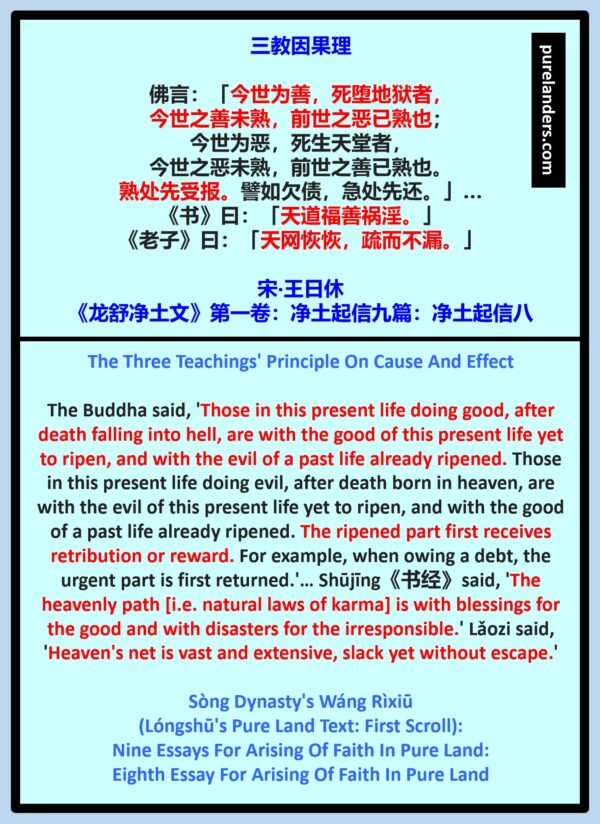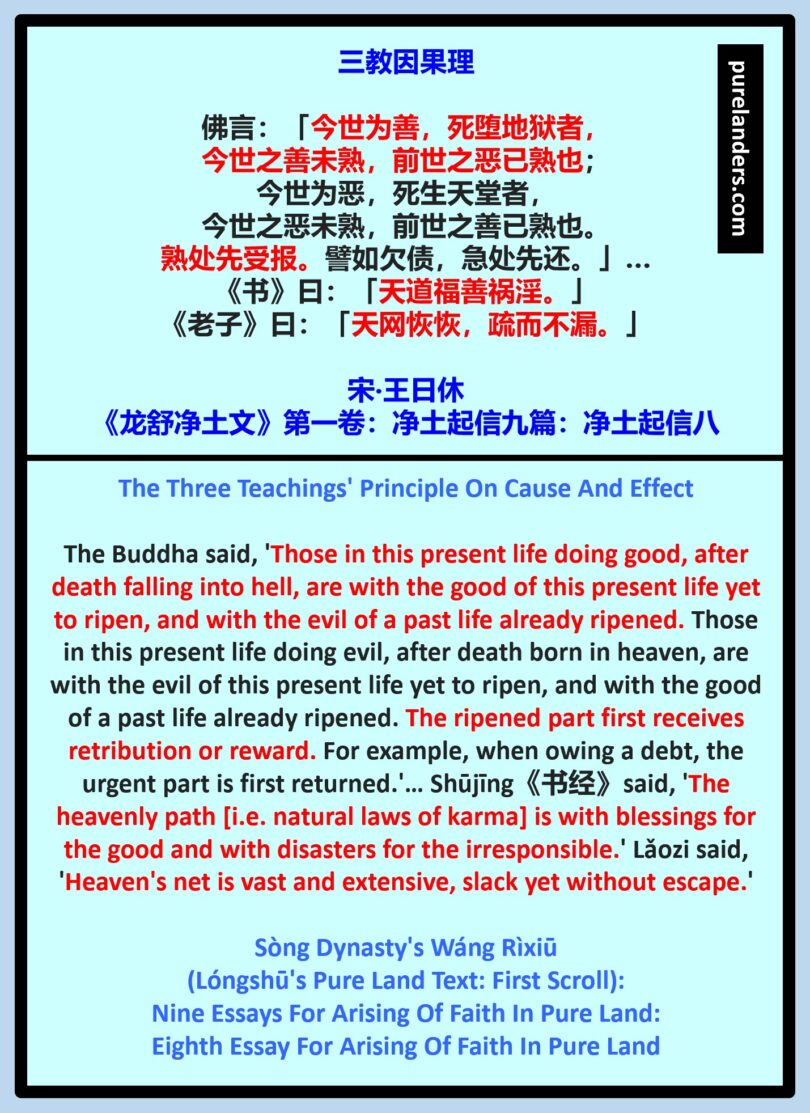净土起信八
Eighth [Essay For] Arising [Of] Faith [In] Pure Land
天网恢恢,疏而不漏
[8] Heaven’s [Karmic] Net [Is] Vast [And] Extensive, Slack Yet Without Escape
人有见目前善恶未有报者,遂不信因果,而因以不信净土。殊不知善恶未有报者,非无报也,但迟速耳。
[There] are people [who] presently see those good [and] evil yet [to] have rewards [and retribution], thereupon not believing [in karmic] cause [and] effect, then because of [this] not believing [in] Pure Land. [They] actually [do] not know [that] those good [and] evil yet [to] have rewards [and retribution, are] not without rewards [and retribution], however [having that] slower [or] faster only.
佛尝谓阿难云:「人有今世为善,死堕地狱者;今世为恶,死生天堂者。」
[The] Buddha once told Ānanda, saying, ‘[There] are those people [in this] present life doing good, [after] death falling [into] hell, [and] those [in this] present life doing evil, [after] death born [in] heaven.’
阿难问:「何故?」
Ānanda asked, ‘[For] what reason [thus]?’
佛言:「今世为善,死堕地狱者,今世之善未熟,前世之恶已熟也;今世为恶,死生天堂者,今世之恶未熟,前世之善已熟也。熟处先受报。譬如欠债,急处先还。」
[The] Buddha said, ‘Those [in this] present life doing good, [after] death falling [into] hell, [are with the] good of [this] present life yet [to] ripen, [and with the] evil of [a] past life already ripened. Those [in this] present life doing evil, [after] death born [in] heaven, [are with the] evil [of] this present life yet [to] ripen, [and with the] good of [a] past life already ripened. [The] ripened part first receives retribution [or reward]. For example, [when] owing [a] debt, [the] urgent part [is] first returned.’
左氏谓栾武子有德,可以庇其子,故其子黡虽为恶而可以免祸;黡之子盈为善,而黡之恶乃累之,故盈虽善而及于难。
[As] Zuǒshì said, Luánwǔzǐ had virtue, [that] could protect his son, thus [was] his son [Luán]yǎn although doing evil, yet able [to] avoid disaster. [When the] son of [Luán]yǎn, [Luán]yíng did good, yet [with the] evil of [Luán]yǎn thus implicated, thus [was Luán]yíng although good, yet involved with difficulties.
[Note 1: This is not about one’s good or evil distinct karma (善恶别业) being able to render another’s person’s karma to be good or evil, or it would remove the need for personal moral responsibility.
Note 2: Although Luányǎn (栾黡) was creating evil karma (恶业), as he had some remnant common good collective karma (善共业) connected to Luánwǔzǐ (栾武子) ripening in his present life, Luányǎn was able to avoid misfortune – until this good karma depletes later. In this sense, Luányǎn was temporarily protected by his own past good karma (善业), as expressed through Luánwǔzǐ’s protection.
Note 3: (Vice versa), although Luányíng (栾盈) was creating good karma (善业), as he had some remnant common evil collective karma (恶共业) connected to Luányǎn (栾黡) ripening in his present life, Luányíng was not able to avoid misfortune – until this evil karma depletes later. In this sense, Luányíng was temporarily implicated by his own past evil karma (恶业), as expressed through Luányǎn’s implication.
Note 4: Collective karma (共业) refers to common karma created together by individuals. It still includes the distinct karma (别业) of the individuals involved as it is near impossible for all to create exactly the same kind of karma with equal intensity. Collective karma is not about one person inheriting another’s good or evil karma, with this being impossible as one’s karma is self-created. Even when one receives another’s dedicated merits, one must have good karma to have another willing to dedicate them in the first place. While good karma can be dedicated, evil karma cannot be dedicated. If the latter is possible, the evil would be able to ‘transfer’ their evil karma to harm others.]
止于世间目前可见者言之,善恶之报尚有如此者,况隔世乎?
Only [with that] in [this] world, [in the] present [life] that can [be] seen speaking, those rewards [and retribution of] good [and] evil still have such [cases], moreover [in] separated [past and future] lives [too]?
《书》曰:「天道福善祸淫。」
Shūjīng《书经》said, ‘[The] heavenly path [i.e. natural laws of karma] [is with] blessings [for the] good [and with] disasters [for the] irresponsible.’
《老子》曰:「天网恢恢,疏而不漏。」
Lǎozi said, ‘Heaven’s [karmic] net [is] vast [and] extensive, slack yet without escape.’
[Note 5: The natural laws of karma are always operating, comprehensively and unrelentingly, encompassing all sentient beings in its intricate workings. Due to apparent ‘delays’ in the ripening of good and evil karma at times, when ‘instant karma (in effect)’ is expected instead, the laws of karma might appear ‘loose’, but nothing intentionally thought, said (or written) and done (in thought, speech and deed, which creates karma) is capable of slipping through its widely cast net, which will in time be hauled in with that all along already caught. Even apparent ‘delay’ of the ripening of one ‘set’ of karma is not truly a delay as there is the timely ripening of another opposite ‘set’ of karma at work – for the time being. Since there might be delay in the ripening of our evil karma, that will cause suffering, we should all diligently practise repentance and create good karma now, so as to mitigate evil karma’s effects.]
是三教皆言此理,但有迟速耳。
These Three Teachings [of Buddhism (佛教), Confucianism (儒教) and Taoism (道教)] all speak [of] this principle, however having [that] slower [or] faster only.
岂可以目前未见果报,而遂不信因果,因以不信净土乎?
How can [there be] with presently yet [to be] seen fruits [of] rewards [and retribution], thereupon not believing [in karmic] cause [and] effect, then because of [this] not believing [in] Pure Land?
[Note 6: The Pure Land is the manifested magnificent effect of Amitā(bha) Buddha’s (阿弥陀佛) perfect avoiding of (creating) all evil karmas, perfect creating of all good karmas, and perfect purifying of his mind.]
宋‧王日休
《龙舒净土文》
第一卷:净土起信九篇
Sòng [Dynasty’s] Wáng Rìxiū
Lóngshū’s Pure Land Text):
First Scroll: Nine Essays [On] Arising [Of] Faith [In] Pure Land
Namo Amituofo : Translation by Shen Shi’an
上篇
Previous Essay:
致不信因果,不信净土者
[7] For Those Not Believing Cause And Effect, Not Believing In Pure Land
https://purelanders.com/2021/10/01/7-for-those-not-believing-cause-and-effect-not-believing-in-pure-land/
下篇
Next Essay:
念佛者如何生莲华?
[9] How Do Those Mindful Of The Buddha Grow Lotus Flowers?
佛如何护迎诸念佛者?
How Does The Buddha Protect And Receive All Those Mindful Of Him?
https://purelanders.com/2021/10/01/9-how-do-those-mindful-of-the-buddha-grow-lotus-flowers/
九篇
Nine Essays:
《龙舒净土文》
第一卷:净土起信九篇(等)
Lóngshū’s Pure Land Text:
[1] First Scroll: Nine Essays On Arising Of Faith In Pure Land, etc.
https://purelanders.com/longshu1






